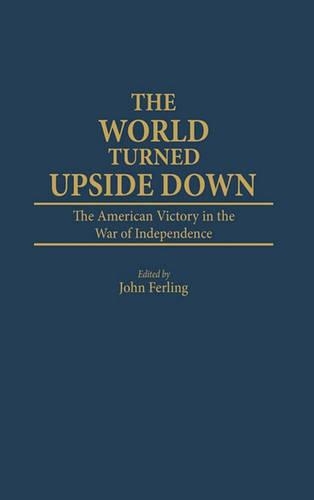
The World Turned Upside Down: The American Victory in the War of Independence
(Hardback)
Publishing Details
The World Turned Upside Down: The American Victory in the War of Independence
By (Author) John Ferling
Bloomsbury Publishing PLC
Praeger Publishers Inc
24th October 1988
United States
Classifications
Tertiary Education
Non Fiction
973.3
Physical Properties
Hardback
260
Description
The World Turned Upside Down is a collection of original essays dealing with various aspects of the American victory in the War of Independence. Each contributor, through examination of a particular topic, attempts to explain why the American colonists won the war, or why Great Britain lost. Reflecting the benefits of the impressive scholarship of the past fifty years, the objective of the essays is not only to synthesize the disparate strands within earlier studies, but, through fresh research, to offer new insights into the outcome of this conflict. Virtually every facet is considered, from the leaders to the common soldiers, from land warfare to naval engagements, from the eastern theater to the western frontier fighting, from logistical considerations to political matters, and from domestic concerns to the international ramifications of the war. This is the first collection published in the last twenty five years that focuses on the one paramount question: Why did the colonists win the War of Independence It enriches our understanding not only of the complexities of the worldwide struggle that erupted in 1775, but of the many factors which led the diplomats in Paris in 1782-83 to recognize the reality of the American victory. This book will be of particular interest to those engaged in the study of American history, U.S. military history, and the American Revolution.
Reviews
. . . this is a useful collection of essays whose strengths lie in synthesizing an enormous amount of information and deepening our knowledge of the factors responsible for American victory.-The Historian
. . . this volume has a great deal to offer the historian. It is a book of substance and intelligence. It adds quite elegantly to the history of the revolutionary era.-The Journal of American History
Drawing on recent scholarship and their own research, 11 able historians examine the American Revolution as a military event. Fred Anderson traces the Colonial roots of the American militia and military structure. James Kirby Martin focuses on the Continental Army's contribution to internal unity and national identity in the new republic. Paul David Nelson illustrates the American soldiers' superior capacity to endure deprivation to achieve victory. John Ferling illustrates the invaluable role of George Washington, and Hugh F. Rankin notes the contributions of five of Washington's subordinate generals. Mark Edward Lender finds the American logistical effort to have been weak but sufficient to achieve the necessary victory. James H. O'Donnell focuses on the importance of the American success along the western frontier, and Jonathan G. Rossie reviews the politics of the war, including the struggles between Congress and its generals. W.J. Eccles establishes the critical role of the French in the American victory. Sylvia R. Frey examines the British armed forces, finding them in need of reform, and unfit to win a political war like that in the US. Mary B. Wickwire argues that the British navy performed inconsistently, often incompetently, and must share blame for the British failure. The essays are clearly written and include extensive notes and a good bibliographic essay. Together they serve as good summary of current scholarship on the military and political forces that resulted in American success in the War for Independence. Recommended for all academic libraries.-Choice
." . . this is a useful collection of essays whose strengths lie in synthesizing an enormous amount of information and deepening our knowledge of the factors responsible for American victory."-The Historian
." . . this volume has a great deal to offer the historian. It is a book of substance and intelligence. It adds quite elegantly to the history of the revolutionary era."-The Journal of American History
"Drawing on recent scholarship and their own research, 11 able historians examine the American Revolution as a military event. Fred Anderson traces the Colonial roots of the American militia and military structure. James Kirby Martin focuses on the Continental Army's contribution to internal unity and national identity in the new republic. Paul David Nelson illustrates the American soldiers' superior capacity to endure deprivation to achieve victory. John Ferling illustrates the invaluable role of George Washington, and Hugh F. Rankin notes the contributions of five of Washington's subordinate generals. Mark Edward Lender finds the American logistical effort to have been weak but sufficient to achieve the necessary victory. James H. O'Donnell focuses on the importance of the American success along the western frontier, and Jonathan G. Rossie reviews the politics of the war, including the struggles between Congress and its generals. W.J. Eccles establishes the critical role of the French in the American victory. Sylvia R. Frey examines the British armed forces, finding them in need of reform, and unfit to win a political war like that in the US. Mary B. Wickwire argues that the British navy performed inconsistently, often incompetently, and must share blame for the British failure. The essays are clearly written and include extensive notes and a good bibliographic essay. Together they serve as good summary of current scholarship on the military and political forces that resulted in American success in the War for Independence. Recommended for all academic libraries."-Choice
Author Bio
JOHN FERLING, Professor of History at West Georgia College, is writing a biography of John Adams. He is the author of The Loyalist Mind (1977), A Wilderness of Miseries: War and Warriors in Early America (1981), and The First of Men: A Life of George Washington (1988).
